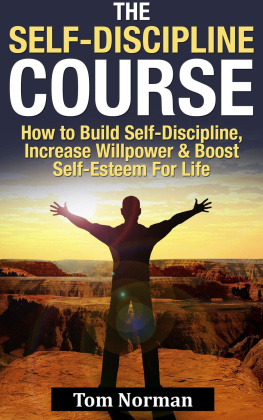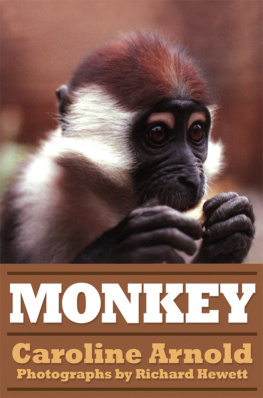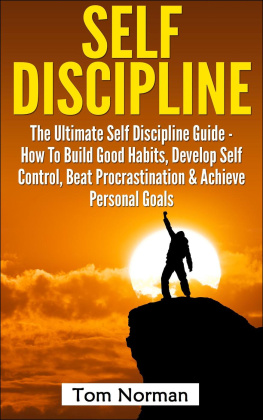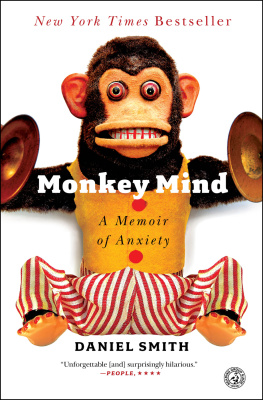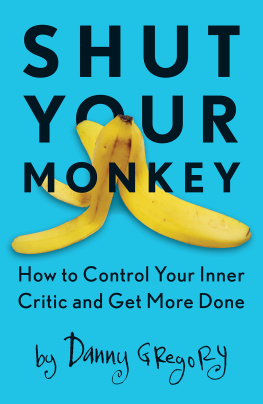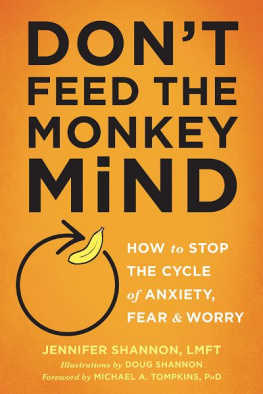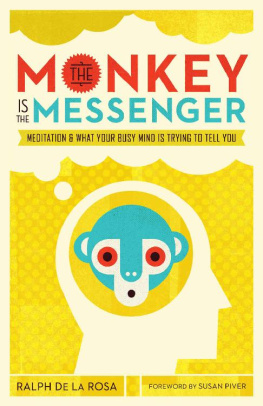THE MONKEY THEORY
A computer engineer by training, Sfurti took a leap of faith at the age of twenty-three by leaving her Software Tester job to write her first book, Think and Win Like Dhoni . Two years of hard labour later, the book was published to great acclaim.
Since then, Sfurti has completed her Masters in Organisational Psychology, been the recipient of several awards, a TedX speaker as well as an acclaimed author, motivational speaker and corporate trainer.

First published by Westland Publications Pvt. Ltd. in 2019
1st Floor, A Block, East Wing, Plot No. 40, SP Infocity, Dr MGR Salai, Perungudi, Kandanchavadi, Chennai 600096
Westland and the Westland logo are the trademarks of Westland Publications Private Limited, or its affiliates.
Copyright Sfurti Sahare, 2019
ISBN: 9789387894624
The views and opinions expressed in this work are the authors own and the facts are as reported by her/him, and the publisher is in no way liable for the same.
All rights reserved
No part of this book may be reproduced, or stored in a retrieval system, or transmitted in any form or by any means, electronic, mechanical, photocopying, recording, or otherwise, without express written permission of the publisher.
Contents
B e it sports, or be it anything in life everything boils down to how you handle your idle time (the free time between two balls, innings etc.).
The time between two balls in cricket, the time between two shots in shooting or the time a person spends idle dictates how he will perform.
What happens generally is that what your mind tells you in your free time, defines your complete story in cricket or for that matter in life. The mental chatter, or in Sfurtis words: Monkey Talk!
Sometime ago, I happened to speak to a few champion sportsmen of India and they also recognised the impact this negative mental chatter has on performance.
In sports, especially in cricket, a game lasts for eight to ten hours (five days in case of a Test match), so keeping all these voices (the monkey chatter) aligned to the target determines how you perform. For instance, if a fielder drops a catch, suddenly the negative monkeys start telling him that he will drop the next one too! Similarly, if a batsmen has been bowled out by a particular bowler thrice previously, the Fear Monkey or the Judgement Monkey starts raising an alarm that this time too he will get out when that bowler bowls. If a batsmen is playing well and if he plays four balls without scoring or if he cant hit well, the negative monkeys start telling him that he is not good enough.
On top of that, a cricketer starts getting worried about the impact of a dropped catch or a mistimed six on Twitter and wonders if people have already started trolling him!
There is a lot happening in the world that is unpredictable. The dynamic nature of the game has an impact on a persons career. Today, news channels and social media has become so powerful that the slightest mistake can cost one a great deal. Therefore, cricketers have to be very tough mentally. When a cricketer scores a 100, he feels on the top of the world and the media also makes him out to be the king. When he scores badly, he feels demotivated or in fact even if he scores a 100, but in 120 balls, people are ready to troll him calling slow and selfish. This is an acid test for him.
Hence, being mentally tough and to keep the negative monkeys at bay is the key!
As with cricket, so with life.
This book helps a person to understand those voices within our head and deal with them one by one. This book is a creative tool to teach you how you can control this monkey chatter and channelise your attention in the right direction.
Today, more than motivation, young people lack focus. With technology erupting and the world becoming a small place, its very easy to get distracted and confused.
This book helps you recognise the different forms of monkeys in your head. I could relate to the P-Monkey and his way of tricking people to avoid the gym. Similarly, how the Monkey paralyses your vision and keeps you away from thinking clearly also struck a chord with me. The metaphor of the Purple Island is brilliant and I think one should follow the complete sequence of the book to understand it better.
My experience with many international cricketers tells me that the topmost can handle their wild monkeys very well. For instance, M.S. Dhonis biggest quality is that he is not afraid of anything and when you are not afraid, these negative voices cannot disturb you. They cannot fool you and take your attention away. And with this focused mind you can just follow the process and become good at what you do. Thats why he is the master of handling pressure and is regarded as one of the best finishers in the world.
The principles and solutions given in the book are awesome. Do read, label your monkeys and get the maximum out of it.
Happy Reading!
DEEP DASGUPTA
Former International Cricketer and TV Presenter
I n 2016, I published my first book Think and Win Like Dhoni. Originally, I had not set out to write a book on M.S. Dhoni. I only wanted to learn from him and emulate him. Our backgrounds were similarwe both belonged to a Tier-II city, had a simple middle-class upbringing, our parents biggest concern was that we land a secure job and so on. In my case, another thing that figured prominently in my parents list of worries was my marriage.
Like Dhoni, I too had big dreams and as time passed, I found that I was not in concurrence with my parents version of how my life should be. I wanted to be more than a computer engineer. I wanted to pursue my dreams, grow as an individual and experience that adrenaline rush.
After reading all that was available on Dhoni in books, magazines and the internet, I finally wanted to meet him. Why? Because I felt there was more to him than just cricket. And I wanted to crack that code of being more.
When I met him and spent some time with him, I got a glimpse of what Mahi was, beyond the cricket ground. His walk, his talk, the way he carried himself, the way he attentively listened to me, even though I was then a nobodyall of it was overwhelming. He had winner written all over him. He was not just a cricketing star, but a phenomenon. He was a winner in life and how he had managed to do that was what I wanted to learn.
My experience was so mind-blowing that I could not keep it to myself. I had to talk about him, tell people that he was more than his wicket-keeping, more than the runs he makes and more than all the trophies he wins. He was a winner. A finisher. And I had to tell people what made him that. To decode Mahi was my goal. All of this finally shaped up into Think and Win Like Dhoni.
The book was an outstanding success.
The book also brought me into contact with a number of young people who read the book, believed in it, believed in me and wanted to make a difference to the world through their lives.
Much of Think and Win like Dhoni dealt with staying calm under pressure, being disciplined and not losing ones cool. Many readers wrote to me about things that they had noticed about themselves after reading the book. While some people said that they were easily able to control their anger, emotions, mood swings and so on, a number of others also said that in spite of being aware of the importance of being calm, they were unable to control their anger. That despite knowing the value of discipline, they were unable to tame their indiscipline; that regardless of the knowledge that smoking kills, they just could not resist the temptation; and even though they knew that getting up early was good, they could not manage to get out of their cosy beds.



